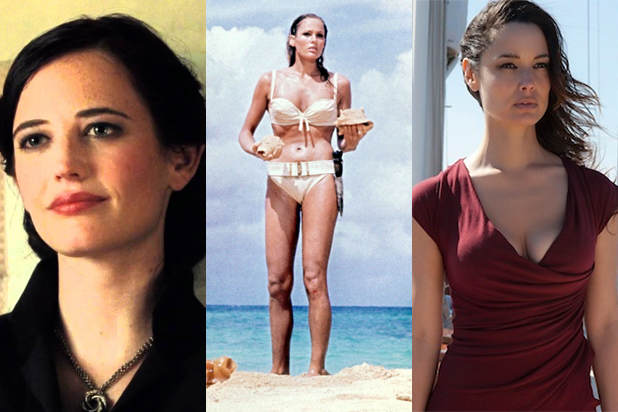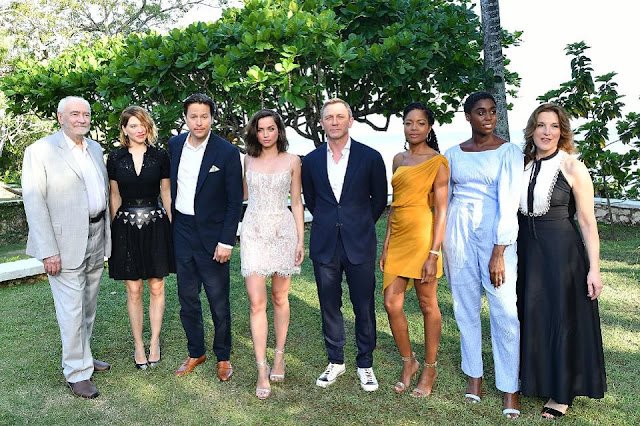Is Playing A "Bond Girl" A Curse Or Blessing For Actresses?
From Ursula Andress to Eva Green, why is playing a modern "Bond Girl" a curse to some actresses and a blessing to others?
 |
| Eva Green, Ursula Andress and Berience Marlohe as "Bond Girls" (CREDIT: EON) by Jack Linsdell |
In 1962, Terence Young's "Hitchcock but bigger" slow-burn, spy thriller Dr No became the first movie in EON's now 25-film franchise. The Sean Connery-led flick set the template for the 007 franchise, introducing the world to all the tropes and elements that would make Bond unique. People flocked to a Bond film over any other rival action/fantasy flick (at least before the late 1980s) BECAUSE the specific 007 tropes made it more than just "another action flick". Amongst the tropes Dr No established were the first "Bond, James Bond" introduction, a gunbarrel sequence at the beginning of each movie and the requirement to send Bond to the most exotic locations (in this case Jamacia). However, when (late in the second act) Ursula Andress seductively emerged from the sea in that iconic white bikini, Dr No gave audiences Bond's most significant (and talked about) trope. Yes, I'm talking about the "Bond Girl".
Andress became the very first (not counting Slyvia Trench) "Bond Girl", plucked from obscurity and put into instant stardom, despite the fact she couldn't speak English and had very little (all due respect) acting talent. She bagged a Golden Globe for best Newcomer and went on to have a prosperous acting and modelling career. This set a precedent (or false expectation) amongst a whole generation of young actresses/models who chased the coveted roles of "Bond Girls" in subsequent films with the hope that their lives and careers would be boosted in the same way. The modern Bond films (from Brosnan's GoldenEye in 1995 to Craig's most recent Spectre) have perhaps seen the franchise's biggest success story in turning unknown actresses into household names. But, for every actress that benefited from being a "Bond Girl", many have suffered from it's curse. So, is being a "Bond Girl" a curse or a blessing?
Let's start with the downsides. The curse of being a "Bond Girl" is complex. Back in the early days of the series, the producers would scour the world looking for the most beautiful women to feature as their next "Bond Girl". These women, like Claudine Auger from Thunderball, were hired because of their looks, but often couldn't act or speak English, so were always dubbed over. Fun fact, voice-over artist Nikki van der Zyl did most of the dubbing for the earliest "Bond Girls", as well as being a dialogue coach to Goldfinger star Gerte Frobe. Anyway, I digress. As a result of their poor English or ethnic origins, many of these actresses found making a career in Hollywood difficult, to the point that most faded quickly into the background and were never seen until some anniversary Bond documentary was made years later.
Another part of the curse revolves around luck. Some actresses just get lucky in that Bond gives them the big break they wanted or hoped for. In the modern era, the "Bond Girl" in Pierce Brosnan's 1995 007 debut GoldenEye is a perfect example of this. Born of Polish and Swedish descent, actress Izabella Scorupco went largely forgotten about after starring in the Martin Campbell-directed flick. Despite being drop dead gorgeous and having oodles of acting talent, certainly stealing the screen with her charismatic and layered performance (just see the horrific scene when some Russian control workers are gunned down), Scorupco gained nothing from being a "Bond Girl". Hell, her biggest (and only) post-Goldeneye acting success was in the 2000 survival film Vertical Limit. And, she only got that part because Campbell directed that too. Scorupco is definite proof that being a "Bond Girl" can come with a curse, and in her case especially, that's a big shame.
In Daniel Craig's third and infamous outing as 007 in Sam Mendes' "Bond does Christopher Nolan" blockbuster Skyfall, one of it's two "Bond Girls" (or by this point, "Bond Women") was French actress Berience Marlohe. After capturing the mystic and vulnerability of Severine in one of the biggest blockbusters of all time (Skyfall grossed $1.1 billion worldwide), you'd be forgiven for thinking Marlohe would have been scooped up by numerous casting agents since. However, in these last eight years, she's had no acting opportunities within Hollywood, and has become yet another "famous for a moment then forgotten" face. Maybe Skyfall was so exponentially successful that Marlohe was essentially typecast after just one movie. Or, perhaps because her character was far from the best written "Bond Girl" and died too quickly and in a way that made Bond look like a sexual abuser, that reflected badly on Marlohe.
Okay, so who has benefited from being a "Bond Girl" then? Well...during Brosnan's run as 007, two big Hollywood stars were born. First, in GoldenEye, newcomer Famke Janssen shot to fame when she played one of the film's villains Xenia Onatopp, a ferocious and sexually dominant assassin. Janssen would go onto to a huge acting career after 1995, becoming the centerpiece of two big franchises. She played Jean Grey in the X-Men series (2000-2014) and Lenore Mills alongside Liam Neeson in the Taken trilogy (2008-2014). She squeezed her way (you're welcome) into Hollywood stardom BECAUSE she was a "Bond Girl". In Brosnan's fourth and final outing as Bond in Die Another Day, Rosmund Pike played one of the film's "Bond Girls". Although only a small part in a critically trashed film, Pike cemented herself as a leading actress in Hollywood thereafter, going on to work with some of the biggest stars (Ben Affleck, Tom Cruise) in some of the biggest adult-rated dramas of the modern age (Gone Girl and Jack Reacher).
When Daniel Craig took over the role in 2006 with Martin Campbell's Casino Royale, actress Eva Green went from being a nobody to a leading Hollywood star overnight. Her charismatic, quick-witted and emotionally-wrought portrayal of Vesper Lynd won Green the BAFTA for Best Rising Star and gave her subsequent big roles in The Golden Compass and recent Tim Burton fantasies Dark Shadows and Miss Peregrine's Home For Peculiar Children. Sure, she may have debuted the year before in Ridley Scott's Kingdom of Heaven, but it was Bond that "made her". Craig's next 007 flick made two stars of the actresses playing it's "Bond Women". Marc Forster's "Bond does Bourne" action thriller Quantum of Solace created stars out of Olga Kurylenko who played the feisty and tormented Camille and Gemma Arteron who was Strawberry Fields. Kurylenko (who I like a lot) would go on to be in Russell Crowe's The Water Diviner and Tom Cruises' Oblivion amongst many other film, cementing herself as a solid action star and a very talented and underrated drama actress too. Arteton (who I also like) went on to a prosperous career with key roles in Hansel and Gretal, Clash of the Titans and Matthew Vaughn's upcoming Kingsman prequel The King's Man. All these very talented actresses in many ways owe their careers to being a "Bond Woman", and are perhaps the finest examples of how being that prestigious role in the latest Bond flick can literally change your life. For them, being a "Bond Girl" was most certainly a blessing.
So, it's clear there are people who have benefited from being a "Bond Girl", and those that have been cursed by it too. However, it seems there are more success stories than "curse" ones, so maybe the likes of Marlohe and Scorupco were just very, very unlucky. Maybe, it's about the character you play. Vesper Lynd and Camille Montes were very strong and well-crafted characters, making them memorable parts in successful films. In Marlohe's case, Severine was not a well-written character compared to the likes of Lynd, and maybe suffered from the curse as a result. Maybe, it's still about ethnicity. The likes of Marlohe and Scorupco could speak perfect English, but maybe their ethnicity played a part whereas the likes of Pike and Arteton who are British found easier success. As sad as that sounds and as inclusive as Hollywood likes to make itself sound, these problems do lie in the industry.
Anyway, it's clear that being a "Bond Woman" in the modern era of Bond flicks will get you noticed. It's down to luck, your own ethnicity and the strength of the character you play that'll determine how long your noticed for.


Comments
Post a Comment